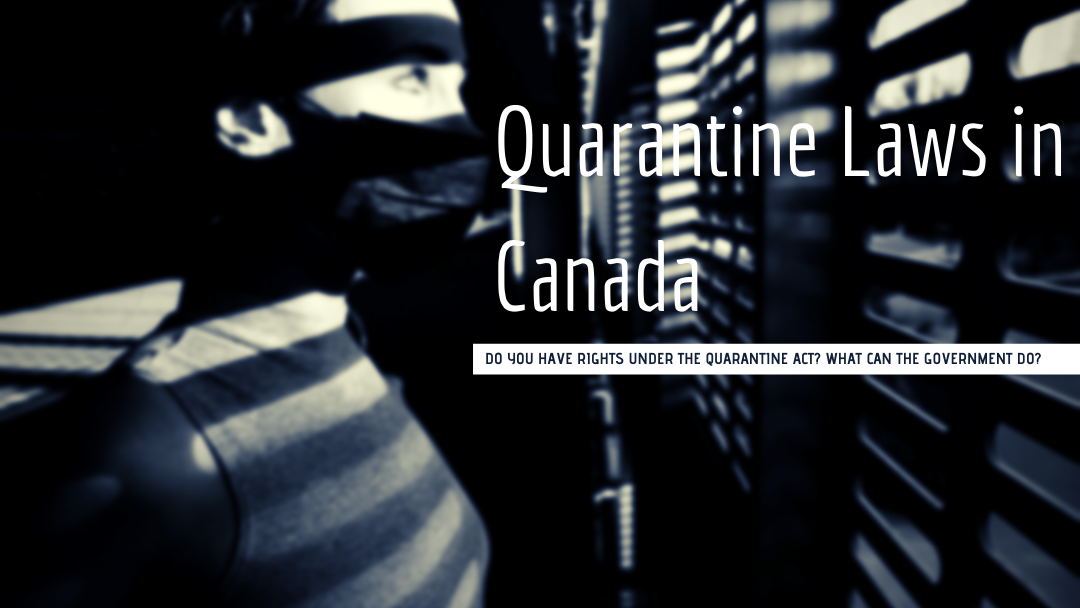
We have been hearing a lot about quarantining. When the COVID-19 pandemic hit the first epicentre of Wuhan City, in Hubei Province, the area went into lockdown. Many Canadians were locked down in the area asking for help to return to Canada and willing to be quarantined in order to get home. As more and more countries around the world have become affected, we have been hearing messages that Canadians returning from abroad and travelling must self-quarantine. What does that mean? How can Canada enforce it?

In 2005, Canada enacted the Quarantine Act with the purpose of protecting public health and preventing the introduction and spread of disease. Under the Quarantine Act, the government can designate any place in Canada as a quarantine facility and can amend, cancel, or reinstate the designation. Under the Quarantine Act, the government can stop or prohibit anyone from entering into Canada if the persons, regardless of their citizenship class, was in a foreign country or territory where there is a disease outbreak, particularly when the introduction or spread of the disease would pose imminent or severe risk to Canadians or if allowing them to enter would introduce or spread a communicable disease. When Canada sent its plane to bring Canadians home from Wuhan, they told them before they got onto the plane that by boarding voluntarily they would be consenting to the condition of being detained, so as to avoid the issue of arbitrary detention violations of the Charter. These Canadians were quarantined at the Canadian Forces Base in Trenton, Ontario. The government stated: “Individuals put in quarantine were advised of their right to retain and instruct counsel and could access counsel of their choice by using the Internet, their cellphone, or other phones provided in the quarantine facility… Officers were also available onsite to answer any questions that these individuals might have about the quarantine and their rights and obligations under the Quarantine Act.”


Under the Quarantine Act, the Minister designates analysts, screening officers, quarantine officers, or environmental health officers. Quarantine Officers and Review Officers designated by the Minister are qualified medical or health care practitioners. For anyone who has travelled, we know we must go through customs when we enter. Under the Quarantine Act, you may be asked questions and screened about your health. When entering, travellers may also be seen by screening officers who may ask a series of questions and use screening technology that does not enter the traveller’s body. That is why they may use devices to check your temperature without putting a thermometer into your mouth.
If a traveller refuses to be screened, then a screening or quarantine officer must be informed. Going against screening, or refusing to answer screening questions when there is suspicion that you could be carrying a communicable disease, could make you liable to a summary conviction of a fine up to $200,000 or jail for up to 6 months.
Upon arrival as a traveller, a screening officer may also examine your bag or personal belongings if they suspect you may have a communicable disease, i.e., a disease that can be spread person to person or into a community. They can perform any test or analysis necessary and even take a test sample of any of your property or belongings if they suspect it may be carrying a source of communicable disease. If a quarantine officer asks you to produce information, including identification or medical information, or requires your assistance, then you must provide reasonable assistance for them to perform their duties. You have a right to request that your identification not be disclosed and your identifying information will not be disclosed unless authorized by you in writing; however, if the Minister has reasonable grounds to believe that your personal information is necessary to disclose to someone else who may have had contact with you and may be in danger of exposure to the communicable disease, then they may disclose your personal information.
Peace officers (e.g., police, bailiffs, sheriffs, wardens, etc.) may help to enforce the Quarantine Act. If you’re suspected of a crime involving an infectious agent or biological toxin, then the Minister may disclose relevant information to the peace officer including:
(a) the name, sex, age and date of birth of the traveller;
(b) a photograph of the traveller and any other means of identifying them;
(c) the traveller’s itinerary, home address and location;
(d) the description of any conveyance used for carrying the traveller;
(e) the name of the infectious agent or biological toxin; and
(f) the manner in which the traveller may have acquired the communicable disease or vectors.
If you are to attend a quarantine facility, you may not leave unless a quarantine officer permits it.
Anyone who violates or commits an offence that violates the Quarantine Act may be liable to either a summary or indictable conviction based on the seriousness of the offence. If convicted by summary, then they will be liable to a fine of up to $300,000 and/or up to 6 months in jail. If convicted by indictment, then they may be liable of a fine up to $1,000,000 and/or up to 3 years in jail!
If you are a traveller who believes or has reasonable knowledge to believe that you might have a communicable disease, you have been in close proximity with someone that has, or you reasonably believe that you have a communicable disease, then you must disclose this to the screening officer or else you are guilty of an offence and may be liable to:
(a) conviction on indictment, to a fine of not more than $500,000 or to imprisonment for a term of not more than three years, or to both; or
(b) summary conviction, to a fine of not more than $200,000 or to imprisonment for a term of not more than six months, or to both.
If someone willfully tries to obstruct a screening officer, quarantine officer, or environmental health officer, they are in violation of the Quarantine Act and subject to the above liability.
A quarantine officer cannot enter your home without a warrant or consent, but if they believe they need to then they can get a warrant from a judge on an ex parte application (expedited process).
So if you’re a traveller who has been told that you need to quarantine, and you don’t, then technically the government could choose to enforce the Quarantine Act against you. You could very well be liable to an offence under the Quarantine Act and be subject to the liabilities outlined.

Disclaimer: This post is for informational purposes only and does not constitute legal advice. I am not responsible for any damages resulted from using information in this article. Please consult a lawyer for advice on your unique circumstances.
Sources:
Quarantine Act, S.C. 2005, c. 20
Balakrishnan , Anita. “Canadians quarantined for COVID-19 need due process, independent counsel, says CCLA”, Law Times (9 March 2020), online: <https://www.lawtimesnews.com/news/general/canadians-quarantined-for-covid-19-need-due-process-independent-counsel-says-ccla/327225>
Related Posts
COVID-19 Emergency states – What happens under the Emergencies Act in Canada
Last month, I released a post on the Quarantine Act, before the Quarantine Act was…
April 23, 2020

Triple B | 26th Mar 20
I’m staying home, lol!
Virginia | 27th Mar 20
Good idea. Lol
Britt K | 27th Mar 20
This is important information in light of everything that’s going on today. I’ll be honest, I was completely unfamiliar with the quarantine laws that are on the books. It’s not something that I’ve ever felt the need to dig into previously… Not that we were travelling (or plan on it) anytime in the near future. We’re staying safely at home until it’s safe to hit the campgrounds again, and even then, we’re looking at staying within the province for any vacations this year.
Virginia | 27th Mar 20
With everything that’s happened and is happening, it probably is best to stay within the province this year. Hopefully it will be safe soon 🙂
Efuaye | 25th Apr 20
Thx for the information!
COVID-19 Emergency states – What happens under the Emergencies Act in Canada | Ginny Law Blogs | 15th May 20
[…] month, I released a post on the Quarantine Act, before the Quarantine Act was being used to enforce and make it mandatory for all travellers to […]
Kristen | 20th Jun 20
Great info, thanks!